2023 Annual Report: Staying the course
© His Majesty the King in Right of Canada, as represented by the Minister of National Defence, 2024.
Cat. No. DG1-1E-¨PDF
ISSN 2368-9986
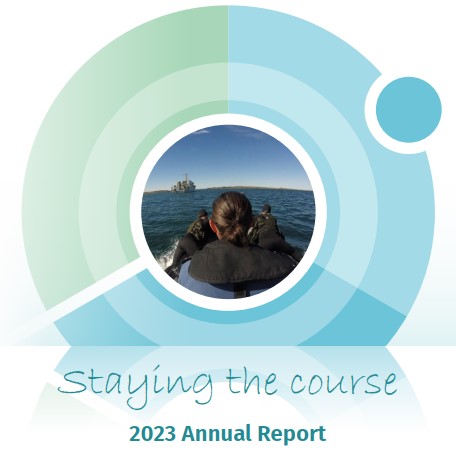
Annual Report 2023
Staying the course
Table of contents

Vihar Joshi
Interim Chairperson and Chief Executive Officer
I am pleased to present the 2023 Annual Report of the Military Grievances External Review Committee (Committee).
The Committee's mandate is one: pursuant to section 29 of the National Defence Act (NDA), the Committee reviews military grievances referred to it and provides findings and recommendations (F&R) to the Chief of the Defence Staff (CDS) and the Canadian Armed Forces (CAF) member who submitted the grievance. We fulfill this mandate through our independent review and our thorough analysis.
The Committee has been without a permanent Chairperson or full-time Vice-Chairperson for over a year and a half now and, early on I adopted a ‘stay the course’ leadership approach as Interim Chairperson. What do I mean by that? We endured, kept going, persisted, proceeded, pressed on. We continued to fulfill our mandate and take care of our people. However, I admit that significant efforts were made to stabilize the organization from an operations perspective, to improve the organization in terms of efficiencies and security, and to enhance engagement with staff, thereby ensuring our people were well taken care of. It is my firm belief that the Committee is on the cusp of reaping the benefits of the hard work accomplished in 2023.
Despite the human resource challenges and the significant number of grievance files awaiting review, the Committee managed to issue more comprehensive F&R reports this year than in 2022. Staffing was without a doubt the priority this year. We supported the launch and promotion of the two Governor in Council (GIC) nomination processes, and we ran several selection processes to bolster Operations with additional team leaders and several grievance officers. The Committee was able to offer development programs to employees interested in exploring new career paths.
The organizational structure underwent an independent review, which is always a good periodic practice to ensure that the structure is optimal to support the Committee’s mandate. A decision was made to invest in writing training, and this will soon translate into more refined F&R reports. Senior management also invested in leadership training focused on how management can mobilize people and provide psychologically safe workplaces.
Internal services were fully engaged in moving the organization to the cloud and improving physical and digital security. We responded to the Call to Action on Anti-Racism, Equity and Inclusion by developing an integrated plan and launching our first Accessibility Plan, both with concrete actions items. We returned to regular publishing of our case summaries, focusing on adding the more recent files. The Committee saw the Safe Space Ambassador program lift off and our Champions presented several events throughout the year in support of Government of Canada priorities.
Ensuring employee mental health and wellness remains essential at the Committee. I issued weekly challenges during Healthy Workplace Challenge month and mental well-being was integrated into the performance objectives of every Committee employee with supervisory responsibilities. Normalizing informal recognition at our monthly all-staff meetings and using the intranet to engage with employees on anything and everything is now woven into our work culture. It is fair to say that internal engagement has increasingly become the needle keeping the fabric of our workplace whole.
This annual report may well be my last as Interim Chairperson and Chief Executive Officer and I would like to seize this opportunity to say that it has been an honour to lead this organization through two years of hard work and in constant search of betterment. It is a privilege to continue to work with a dedicated group of public servants. Every day I am the better for it.
Vihar Joshi, OMM, MSM, K.C., CD, LSM, CIC.C
Interim Chairperson and Chief Executive Officer
2023 at a glance
Our program: Independent review of military grievances
For the Operations Team, every day of every year is about fulfilling the Committee’s mandate to the best of its abilities. However, this year brought with it a resolve to augment capacity for the future once and for all. Even though much time and energy were spent on recruitment and training efforts, the team still managed this year to surpass the number of thorough F&R reports issued in 2022.
We ran staffing processes, hired and trained new team leaders, grievance officers and Registry Office staff. The onboarding process is key to properly resourcing and supporting new talent as they integrate into the Committee. Consequently, a comprehensive updating of all training materials was undertaken concurrently with the selection processes.
Retention being just as important as recruiting, we were pleased to be able to offer professional development opportunities to employees who wished to reorient their careers and gain new experiences.
All employees in the Operations Team were invited to a compelling seminar on writing effective F&Rs and all managers were invited to leadership training focussed on mobilizing people while providing a psychologically safe work environment.
With regards to review of grievances, the Committee provided 215 F&Rs to the CDS and the CAF members who filed grievances. What remains paramount to the Committee is the calibre of our work. We are gratified by the fact that throughout this period of recruitment and training, the quality of our F&R reports remained top notch.
The Committee has a well-established step-by-step grievance review process; however, adapting to new ways of working is essential to continued productivity. The temporary shortage of staff in Legal Services in 2023 led to a slight modification to their involvement in the process without compromising the production of or quality of the F&R reports. Additionally, the variety and depth of subject-matter expertise nurtured year after year lent itself well to further efficiencies in the review of grievance files. Much like Beyond 2020 upheld, being agile is the best response to challenges.
We arrived at the end of 2023 feeling optimistic that we will be able to address a significant number of grievance files within the next few years. We fully expect that the newly onboarded employees and the anticipated appointments of a Chairperson, a full-time Vice-Chairperson and additional Committee Members will bear fruit.
| 2023 | 2022 | 2021 | |
|---|---|---|---|
| Grievances received from the CAF | 168 | 345 | 322 |
| F&R reports delivered to the CAF and the grievor | 215 | 142 | 341 |
| 2023 | 2022 | 2021 | |
|---|---|---|---|
| From the date assigned to a team to the date the F&R report was delivered to the CAF | 9.72 | 5.35 | 4.75 |
| From the date received at the Committee to the date the F&R report was delivered to the CAF | 16.29 | 10.56 | 10.91 |
| 2023 | 2022 | 2021 | |
|---|---|---|---|
| Careers | 50% | 65% | 34% |
| Harassment | 9% | 6% | 8% |
| Medical and dental care | 2% | 2% | 5% |
| Others | 2% | 3% | 2% |
| Pay and benefits | 33% | 23% | 48% |
| Releases | 3% | 2% | 3% |
Note: Totals may not add to 100% due to rounding.
Systemic issues raised by the Committee to the attention of the CDS
Harassment Prevention and Resolution Instructions – Procedural Fairness Principles
The Committee has observed a concerning disconnect between the CAF Harassment policy direction provided by the overarching Defence Administrative Order and Directive (DAOD) 5012-0 and the complementary direction found in the Harassment Prevention and Resolution Instructions (HPRI).
Paragraph 3.7, Note 2, of DAOD 5012-0 requires that the Responsible Officer (RO) disclose all information to be used in rendering their decision. This would necessarily include the respondent’s comments in response to the complainant’s allegations. This Note also requires the RO to allow the parties an opportunity to submit representation following such disclosure. However, paragraph 4.1 [Basic Principles] of the HPRI does not provide any such direction. This gap in the HPRI fails to ensure that the procedural fairness principles outlined in DAOD 5012-0 are respected during the harassment complaint process.
The Committee recommended the Final Authority (FA) direct that paragraphs 4.1 and 6.2 of the HPRI be revised to accurately reflect paragraph 3.7, Note 2, of DAOD 5012-0, thereby ensuring that both the respondent and the complainant receive full disclosure of all information to be considered by the RO in arriving at a decision, especially in those cases where there is no harassment investigation.
Modernizing the Interim Lodgings, Meals and Miscellaneous Expenses Policy
The CAF have acknowledged the frequent delays in the Air Shipment of members’ Household Goods and Effects (HG&E) for outside Canada (OUTCAN) postings to the Pacific region. These delays often exceed the policy limits (a maximum of 45 days) that are provided by section 12.2.01 of the Canadian Forces Integrated Relocation Program (CFIRP) Directive. The policy is in place in the hopes of helping members with the costs of interim lodgings, meals and miscellaneous expenses (ILM&M) upon arrival to their OUTCAN posting, while they wait for their HG&E to arrive.
As evidenced by these frequent and significant delays, the CFIRP Directive on ILM&M is failing to adequately support these CAF members. Notably, the 45-day maximum for ILM&M reimbursement is insufficient to realistically help subsidize the expenses members incur while waiting upwards of 50 to 60 days for their HG&E to arrive.
The Committee recommended that the CAF would be well served to align the normal Air Shipment durations and the policy entitlements. The Committee also recommended that CAF families need to be adequately informed about expected times and delays for OUTCAN Air Shipments (versus policy entitlements) so that these families can assess and plan accordingly.
Canadian Forces Administration Order 49-5 - Reserve Force Promotion Policy (Career Policy - Non-Commissioned Member - Primary Reserve)
The Committee has noticed that the Naval Reserve (NAVRES) do not always apply paragraph 25 of Canadian Forces Administrative Order (CFAO) 49-5, which requires the deferral of a member’s promotion until they have completed their Class “B” or “C” Reserve service. As such, there appears to be a disconnect between the promotion deferral policy outlined in paragraph 25 and its actual application by the NAVRES (and possibly other elements) in that the policy is not being applied as written.
The Committee recommended that the CFAO be reviewed with a view to confirming this policy or aligning it to the needs of the CAF and providing clear policy direction to all members.
Retention of the Medical Referral Form, DND 4006-E
The Committee noted that current CAF policy requires the Medical Referral Form [DND 4006-E] be retained on a CAF member's personnel file, regardless of whether the allegations prompting the referral have been proven or not. The Committee finds it unfair to retain a document of unproven allegations on a member's personnel file as this could be highly prejudicial. However, the Committee supports retaining such a referral document in a member's medical file. It could prove useful in the future should there be a subsequent referral based on new circumstances.
A referral form requiring a CAF member to be medically assessed for a potential medical alcohol dependency should be considered a medical process record and treated accordingly. The purpose of such a referral is to determine whether the “referred individual” suffers from alcohol related issues that could benefit from treatment, and to assist the chain of command in determining if alcohol dependency could have contributed to some confirmed or alleged misbehaviour by a member.
If a physician determines that there is no medical alcohol dependency issue, all that remains are the allegations of misbehaviour. If those allegations are not investigated further or if they do not result in any further administrative action, there is no reason for the medical referral form, mentioning the allegations, to be attached to the member's personnel file.
The Committee recommended that the FA direct a review of the CAF administration of the Medical Referral Form DND 4006-E, giving consideration to the form only being retained as a medical record and not on the personnel files of CAF members.
Centralization of the Post Living Differential Benefits Administration
Having noted the high number of instances of maladministration of the Post Living Differential (PLD) benefit, the Committee suggested that these errors, of considerable financial significance, could be reduced by centralizing the administration of PLD benefits under one centre of excellence. Alternatively, the Committee suggested that the practice of administering PLD benefits while CAF members are undergoing basic training could be terminated, in favour of CAF authorities administering PLD benefits at the member’s first posting, upon completion of basic training. In addition, the Committee noted a particularly high number of instances of maladministration of the PLD benefit in the Montreal region and suspects that many other CAF members may still be receiving PLD benefits they are not entitled to. The Committee has recommended that the CDS launch Operation ZONE 2 to evaluate PLD cases in the Montreal area.
The Committee also noted that the PLD Request / Authorization Form DND 2272 could be improved to better ensure that the PLD allowance is paid only to members who meet the conditions established by the Treasury Board.
The Committee recommended that the CDS consider centralizing the administration of PLD benefits under one centre of excellence and that the PLD Request / Authorization Form DND 2272 be revised to indicate more clearly:
- the member’s place of duty with signed confirmation that it is within a PLD Area (PLDA);
- the member’s principal residence address, with signed confirmation that the address is within the geographical boundary of their place of duty, and the correct PLDA; and
- the specific Compensation and Benefits Instruction provision under which the PLD allowance is authorized for that member, as well as the authorized PLD rate.
168 grievances received in 2023
215 Findings and Recommendations reports issued in 2023
112 Parliamentary enquiries received and completed in 2023
Workforce for 2023
- 43 full-time employees
- 3 Committee Members
Expenditures
- $5,405,994 for salaries, wages and other operating costs
- $780,155 for contributions to employee benefit plans
- $1,077,162 for other operating expenses
- Total expenditures: $7,263,311
Corporate Services: stewardship excellence
Corporate Services play an instrumental role in providing services and support to the entire organization. Their stewardship and strategic advice cannot be understated in the organization’s achievement of its mandate and annual priorities. The small but dedicated group of employees at the Committee led its activities efficiently, creatively and responsibly throughout 2023. The following provides a glimpse into some of the bigger successes.
In response to the Government of Canada’s priorities related to the Call to Action on Anti-Racism, Equity and Inclusion in 2023, the Committee developed a three-year integrated plan. Changes to reflect the amendments to the Public Service Employment Act were implemented to strengthen diversity and inclusion and to address biases and barriers that disadvantage people belonging to equity-seeking groups. A Safe Space Ambassador program was launched to foster a safe and inclusive workplace. The Champions at the Committee organized a commemorative event to honour the National Day of Truth and Reconciliation and arranged for a presentation by the Office of the Commissioner of Official Languages on linguistic (in)security as well as a mental health workshop that explored “because feeling great matters.”
In implementing the commitments made in the Committee’s own Accessibility Action Plan, the Communications team proactively applied the Canada.ca content style guide as well as inclusive language guidelines to all products consistently. These same guidelines will be promoted organization-wide next year to ensure employees at the Committee are aware of the standards. The Champion of Official Languages promoted the closed captioning capabilities that were integrated in all the Committee’s virtual meetings. Additionally, the "inclusive by design" and "accessibility by default" approaches to office space design were fully implemented by equipping all offices with ergonomic equipment.
The Committee reduced its office footprint by decommissioning a portion of its current space. The retained workspace was adapted, and surplus equipment was disposed of accordingly. The Committee collaborated with other similar organizations to design a shared, modern workplace that will be realized at the end of their respective building lease agreements. A new office reservation tool was implemented. Although the Committee registered its organization in the GCcoworking pilot, it did not immediately open it up to all employees. A trial was undertaken by select employees at various GCcoworking locations across the National Capital Region with great success.
The Information Technology (IT) Team dedicated much of 2023 to migrating approximately 80% of the Committee’s workload to the cloud. This significant undertaking was complemented by IT’s equally significant strengthening of our security posture on mobile devices (smartphones and laptops). A three-year plan on continued improved security, both physical and digital, was developed and approved. Regular security briefings are now part of standard practice to enhance security governance and provide insights into the status of the Committee's security program.
The Awards and Recognition Program at the Committee encourages excellence, initiative and personal commitment. While the Committee is fortunate to have a particularly dedicated, talented and passionate group of employees, recognition still remains one of the keys to personal satisfaction and organizational productivity. In 2023, the Committee celebrated National Public Service Week by organizing a lunch at the Officer’s Mess with the CDS, General Wayne Eyre, as well as an afternoon at Britannia Park for all its employees in recognition of their work throughout the year.
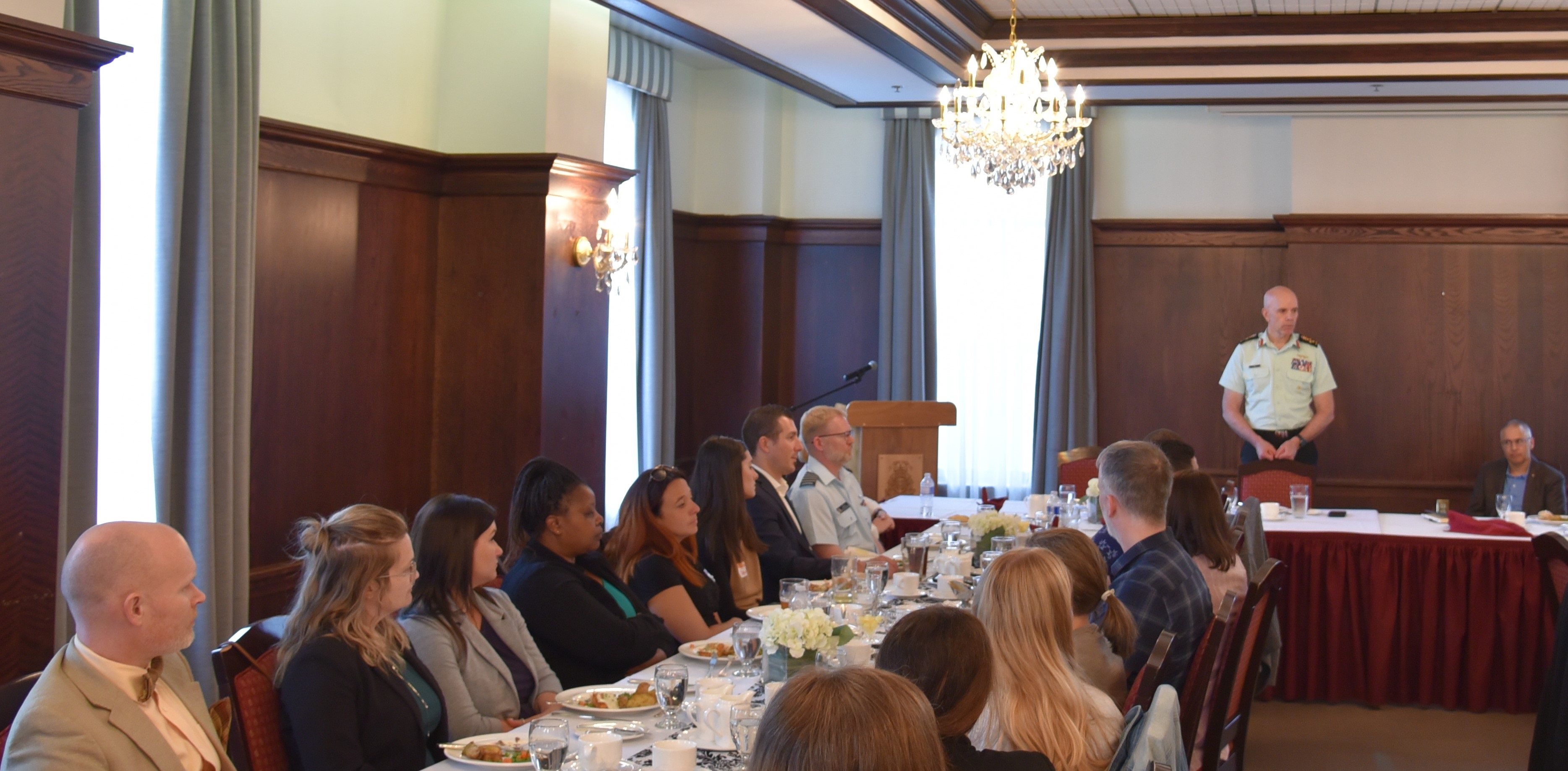
Lunch with the CDS, General Wayne Eyre

The Committee’s people celebrating National Public Service Week
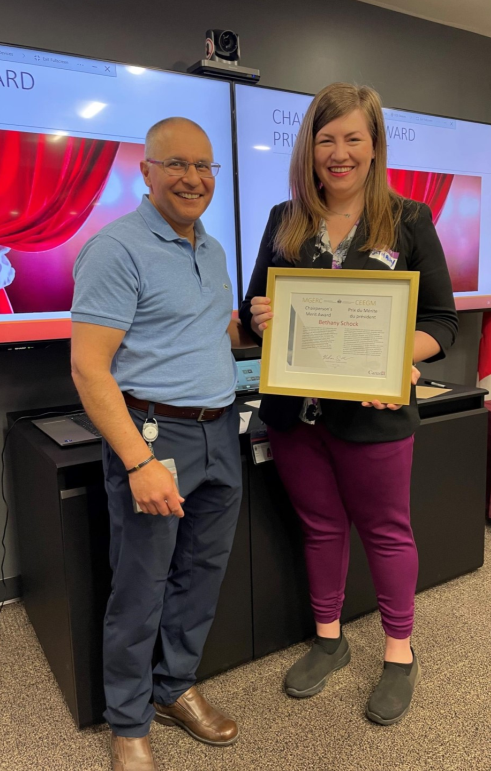
Bethany Schock — Recipient of the Chairperson’s Award
Bethany Schock was the 2023 recipient of the Chairperson's Award for the excellent command of her grievance files as well as her outstanding management and leadership skills. Bethany is committed to delivering the highest quality reports. As a leader and manager, Bethany embraces agility and always goes the extra mile.
Bethany’s consistent outstanding commitment to her work caught the attention of senior management in 2023. In this photo, Bethany receives her award from the Interim Chairperson, Vihar Joshi.
Mental health and well-being remain a priority for senior management. In 2023, the Committee’s Mental Health Action Plan 2023-26 was updated to include new training and awareness activities. In October, the Chairperson issued five weeks of healthy workplace challenges that varied from a gratitude journal to walking one kilometer a day to exploring mindfulness. Employees received monthly blog posts sharing links to readings or videos addressing mental health topics, conflict management issues and resources related to ethics and the Code of Conduct.
Of note in 2023, mental well-being was integrated into the performance objectives of every Committee employee with supervisory responsibilities, including senior executives, directors, managers and team leaders. To support this and get it off the ground in a concrete manner, a leadership workshop on mobilizing people took place. Management unpacked leadership behaviours that can multiply or diminish the capacity of colleagues, explored what it means to feel psychologically safe in the workplace and why it is necessary for effective team performance, and discussed strategies to mobilize people.
Internal communication tools were essential not only for engaging with employees but as a means to keeping them involved. The intranet home page and two active blogs were used daily to keep employees informed on Committee and Government of Canada priorities, news, information and initiatives. Monthly all-staff meetings, online surveys and several events throughout the year equally played a part in feeling and staying connected. Lastly, the Communications team continued to collaborate with the Registry Office to publish over 100 case summaries to the Canada.ca webpage in 2023 as well as update other statistical information.
About the Committee
Mandate
The Committee is an independent administrative tribunal reporting to Parliament through the Minister of National Defence. It reviews all military grievances referred to it by the CDS, as provided for in the NDA and article 7.21 of the Queen’s Regulations and Orders for the Canadian Forces.
Section 29 of the NDA provides a statutory right for an officer or a non-commissioned member to grieve a decision, an act or an omission in the administration of the affairs of the CAF. The importance of this broad right cannot be overestimated since it is, with certain narrow exceptions, the only formal complaint process available to CAF members.
Since beginning operations in 2000, the Committee has acted as the external and independent component of the CAF grievance process. It also has the statutory obligation to deal with all matters as informally and expeditiously as the circumstances permit.
Following its review of referred military grievances, the Committee provides its F&R reports to the CDS and the grievor. The CDS is the final decision-maker and is not bound by the Committee’s F&Rs. In any case where the Committee’s F&Rs are not accepted, the CDS must provide the reasoning in writing.
Types of grievances referred to the Committee
1. Mandatory referrals are grievances relating to one or more of the following matters:
- administrative action resulting in the forfeiture of or deductions from pay and allowances, reversion to a lower rank or release from the Canadian Forces;
- the application or interpretation of Canadian Forces policies relating to the expression of personal opinions, political activities, candidature for office, civil employment, conflict of interest and post-employment compliance measures, harassment or racist conduct;
- pay, allowances and other financial benefits;
- the entitlement to medical care or dental treatment; and
- any decision, act or omission of the CDS in respect of a particular officer or non-commissioned member.
See article 7.21 of the Queen's Regulations and Orders for the Canadian Forces that sets out the types of grievances that must be referred to the Committee once they reach the FA level.
2. Discretionary referrals: The CDS has the discretion to refer any other grievance to the Committee.
Structure
The Committee consists of Committee Members, appointed by the GIC, who are responsible for reviewing grievances and issuing F&R reports.
Under the NDA, the GIC must appoint a full-time Chairperson and at least two Vice-Chairpersons. In addition, the GIC can appoint any other Committee Members that the Committee may require to carry out its functions. Appointments are for up to four years and can be renewed.
Information about GIC appointments can be found at Governor in Council appointments – Canada.ca.
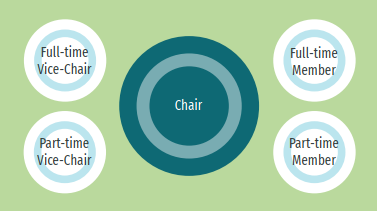
Text description
1 Chairperson and Chief Executive Officer
1 Full-time Vice-Chair
1 Part-time Vice-Chair
1 Full-time Member
1 Part-time Member
The Committee Members work with the support of the Registry Office staff, legal advisors, team leaders and grievance officers who provide analysis and advice on a wide range of issues. The responsibilities of the Committee’s Internal Services include administrative services, strategic planning, security, performance evaluation and reporting, human resources, finance, information management, information technology and communications.
Management Team
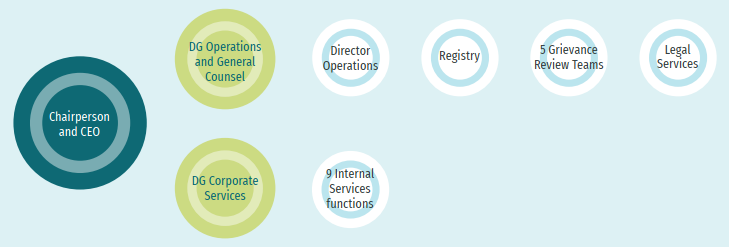
Text description
1 Chairperson and Chief Executive Officer
1 Director General of Operations and General Counsel, made up of the Director of Operations, the Registry, 5 Grievance Review Teams and Legal Services
1 Director General of Corporate Services, made up of 9 Internal Services functions
Grievance Process
Canadian Armed Forces grievance process
The CAF grievance process consists of two levels and begins with the grievor’s commanding officer (CO).
Level I: Review by the Initial Authority (IA)
Step 1: The grievor submits a grievance in writing to their CO.
Step 2: The CO acts as the IA if they can grant the redress sought. Otherwise, the Canadian Forces Grievance Authority assigns an appropriate IA. Should the grievance relate to a personal action or decision of an officer who would otherwise be the IA, the grievance is forwarded directly to the next superior officer who is able to act as IA.
Step 3: The IA renders a decision and, if the grievor is satisfied, the grievance process ends.
Level II: Review by the Final Authority (FA)
A grievor, who is dissatisfied with the IA’s decision, is entitled to have their grievance reviewed by the FA, which is the CDS or their delegate.
Step 1: The grievor submits their grievance to the CDS (or their delegate) for FA-level consideration and determination.
Step 2: Depending on the subject matter of the grievance, the CDS may be obligated to, or may at their discretion, refer it to the Committee. If the grievance is referred for consideration, the Committee conducts a review and provides its F&R report to the CDS and the grievor. Ultimately, the FA makes the final decision on the grievance.
Committee grievance process
The Committee’s internal review process consists of three steps: grievance reception, review and the drafting of F&R reports.
1. Grievance reception
Upon receipt of a grievance, the grievor is contacted and invited to submit additional comments or other documents relevant to their case.
2. Review
The assigned Committee Member holds a case conference where the grievance is reviewed and the issues are identified and discussed. The Committee Member works with a team leader, a grievance officer and legal counsel. If necessary, additional documentation is obtained and added to the file, and subsequently disclosed to the grievor. Although rare, it is possible a hearing may be held.
3. Findings and Recommendations
The Committee Member issues a F&R report, which is then sent simultaneously to both the CDS and the grievor. At this point, the Committee no longer has jurisdiction over the grievance. The grievor receives a decision directly from the FA.
Committee Members
Vihar Joshi

Vihar Joshi joined the Committee in 2018 as Director General of Operations and General Counsel. In December 2022, he was appointed to the role of Interim Chairperson and Chief Executive Officer and his appointment was extended for an additional six months in December 2023.
Prior to joining the Committee, Mr. Joshi served as a Legal Officer in the CAF for 28 years. Aside from providing legal advice at the unit level, he served as Director of Legislative and Regulatory Services, Director of Law/Human Resources, Director of Pensions and Finance Legal Services, Director of Law/Compensation and Benefits, and Assistant Deputy Judge Advocate General/Operations. He was also the Special Assistant to the Judge Advocate General. Upon promotion to Colonel, Mr. Joshi assumed the position of the Deputy Judge Advocate General/Military Justice and Administrative Law. His last posting in the CAF was as the Deputy Judge Advocate General/Administrative Law, a position he held for nine years.
During his time in the CAF, Mr. Joshi deployed on a number of operations. In 1996, he deployed to Haiti as the legal advisor to the Commander, Canadian Contingent, United Nations Support Mission in Haiti. In 2002, he deployed to Bosnia in support of Canada’s commitment to North Atlantic Treaty Organization (NATO) where he served as the Deputy Legal Advisor to the Commander Stabilisation Force. In 2007, he deployed to Afghanistan for a one-year period with the Strategic Advisory Team-Afghanistan as part of Operation Argus. In that capacity, he was a senior advisor to Afghanistan's Minister of Justice and mentor to the senior staff of the Ministry of Justice. For his work in Afghanistan, Mr. Joshi was awarded the Meritorious Service Medal.
In 2013, he was appointed as an Officer of the Order of Military Merit. In 2014 he was appointed as Queen’s Counsel (now King’s Counsel). In 2020, he was awarded the Law Society Medal by the Law Society of Ontario.
M. Joshi holds a Bachelor of Administration from the University of Ottawa, a Bachelor of Laws from Osgoode Hall Law School and a Master of Laws in legislative drafting from the University of Ottawa. He has completed the Advanced Program in Human Resource Management at Rotmans (University of Toronto) and holds the designation of Certified In-House Counsel – Canada.
François Malo

Appointed in May 2018, Part-time Vice-Chairperson François Malo served a three-year term. In March 2021, he was re-appointed for a second three-year term.
Mr. Malo is a veteran of the CAF. He commanded combat missions during the NATO air campaign against the former Yugoslavia, served as Base Commander in North Bay, and held the positions of Director of Space Development and Director General, Canadian Forces Grievance Authority in National Defence Headquarters. It is during this last tenure that Mr. Malo developed unique expertise and experience in the control and administration of the CAF.
Mr. Malo holds a Bachelor of Arts in Political Science, with a minor in Canadian History, from the University of Manitoba. He is also a graduate of Queen's University Public Executive Program and a certified tribunal member by the Council of Canadian Administrative Tribunals.
Nina Frid

Appointed in February 2018, Full-time Committee Member Nina Frid served a four-year term. She was reappointed in June 2022 for a second four-year term.
Ms. Frid has significant leadership experience as a senior executive in the federal public service and extensive experience in policy and regulatory matters. She also has considerable experience leading dispute resolution services at a federal administrative tribunal.
Ms. Frid graduated with a Master's in Law from Osgoode Hall Law School, York University and a Master's in Business Administration from Carleton University. She also holds a certificate in Advanced Alternative Dispute Resolution from University of Windsor Law School and Bachelor-Honours in Economics from the University of Marine Transportation, in St. Petersburg, Russia. Ms. Frid is a certified tribunal member by the Council of Canadian Administrative Tribunals.
Eric Strong

Appointed in December 2017, Part-time Committee Member Eric Strong served a three-year term. He was reappointed in June 2022 for a second three-year term.
Mr. Strong has over thirty years of experience as an Air Navigator on the Sea King naval helicopter in the CAF, as a civilian employee with the Department of National Defence and in the private sector. He has extensive knowledge of the CAF and its finance and personnel policies. Additionally, he has garnered broad experience working in a client-focused environment within the government.
Mr. Strong graduated from the Richard Ivey School of Business, Western University with a Master's of Business Administration. He also holds a Bachelor of Mechanical Engineering from Carleton University. Mr. Strong is an accredited Project Management Professional from the Project Management Institute and a Certified Management Consultant from the Canadian Association of Management Consultants. He is also a certified tribunal member by the Council of Canadian Administrative Tribunals.
Contact us
Military Grievances External Review Committee
60 Queen Street, 9th floor
Ottawa, Ontario K1P 5Y7
Tel: 613-996-8529
Toll free: 1-877-276-4193
mgerc.information.ceegm@mgerc-ceegm.gc.ca
www.canada.ca/en/military-grievances-external-review.html